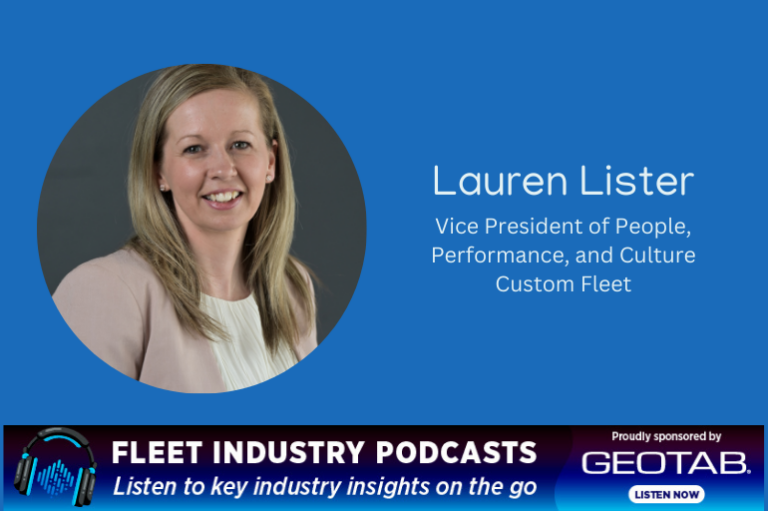In the latest episode of the Fleet News Group podcast, Lauren Lister, Vice President of People, Performance, and Culture at Custom Fleet, delved into the company’s evolving workplace culture, diversity efforts, and its future workforce strategy. Lister, who has been with Custom Fleet for over 12 years, shared candid insights into the importance of belonging and how it aligns with the company’s people-centric approach.
“Belonging is at the heart of what we do,” said Lister, emphasising the organisation’s commitment to diversity, equity, and inclusion (DEI). She explained that DEI is not just about numbers or representation but about creating a work environment where employees feel valued and supported. “When you feel like you belong, you can be your best, and everyone benefits.”
Lister’s career in fleet management began as HR Director at GE Capital, overseeing commercial finance portfolios, including Custom Fleet. When Element acquired Custom Fleet, she transitioned to her current role, focusing solely on fleet management. Reflecting on the shift, she noted, “It’s great to now focus on one industry and see its evolution and opportunities.”
One of Custom Fleet’s standout characteristics is its diverse workforce. According to Lister, 70% of roles directly interface with customers, making customer-centricity a crucial part of their culture. The workforce encompasses roles like business development, relationship management, and strategic consulting, alongside support functions like IT and finance. However, the company intentionally balances hiring experienced fleet professionals with newcomers from other industries. “We believe it’s the balance of diverse experiences that drives growth, learning, and better outcomes,” Lister explained.
Lister highlighted how Custom Fleet’s workforce demographics reflect its inclusive values. The company’s average employee age is 41, with the youngest staff member at 20 and the oldest at 70. While Gen Y (ages 30-44) makes up the largest segment at 51%, younger generations are increasingly represented, with 11% of employees being Gen Z (ages 20-29). She stressed the importance of aligning with younger employees’ values, noting that the new generation prioritises making a difference, mental health, and work-life balance.
To connect with these values, Custom Fleet co-created its company purpose with all employees. Lister believes this inclusive approach helps employees feel a stronger sense of ownership and motivation. “It’s about creating an environment where everyone can bring their whole selves to work and thrive,” she said.
A cornerstone of Custom Fleet’s approach to DEI is its emphasis on ‘belonging’. Lister explained that this extends beyond traditional DEI measures to include a broader sense of cultural and personal connection. The company has implemented several initiatives, including the Intersection network, which supports diverse, marginalised, and underrepresented voices. It comprises streams like Cultural Connect, focusing on Aboriginal, Torres Strait Islander, and Māori engagement, and Pride, ElevateHer, and Capability, which address LGBTQIA+, gender equity, and neurodiversity.
Lister added, “While attracting diverse talent is one goal, we do it because it’s the right thing to do. And we’ve seen candidates cite our work in DEI as a key reason for joining.”
As the industry evolves, Custom Fleet is preparing its workforce for a rapidly changing future. Lister highlighted their two-year leadership development program, “Beyond”, which aims to build skills like empathy, agility, and authenticity in leaders. The company’s recently launched ‘Next’ innovation program also encourages creative thinking across the business. “We want leaders who think strategically while being human-centred,” Lister remarked.
When asked about the future of fleet management, Lister acknowledged the importance of electric vehicles (EVs) but emphasised a holistic approach to mobility. “EVs are not the silver bullet to sustainability,” she said, noting that other forms of mobility, like public transport, should be part of the solution. Custom Fleet’s fleet is fully electric, and the company uses its own experiences to guide customers in transitioning to sustainable mobility.
The global nature of Custom Fleet’s parent company, Element, further amplifies its diversity and innovation efforts. Lister described how the global network enables shared learning and support across regions. “It’s great to be in a company where diversity is valued all the way up to the board,” she added.
Despite not considering herself a “car lover”, Lister maintains a practical approach to transport, driving an SUV that accommodates her family while balancing car use with public transport to reduce her environmental footprint. She believes the industry’s future will require diverse perspectives, innovative thinking, and a commitment to sustainable practices.
Lister closed the conversation by reaffirming that the company’s culture goes beyond DEI to create a truly inclusive environment. “Our customers expect this level of commitment, and it’s not just about meeting expectations—it’s about making a broader impact,” she concluded.
Custom Fleet’s commitment to belonging is more than a buzzword; it’s a strategic driver that aligns employee well-being with customer success and societal impact. Lister’s insights paint a picture of a company actively preparing for the future while staying true to its people-first ethos.






